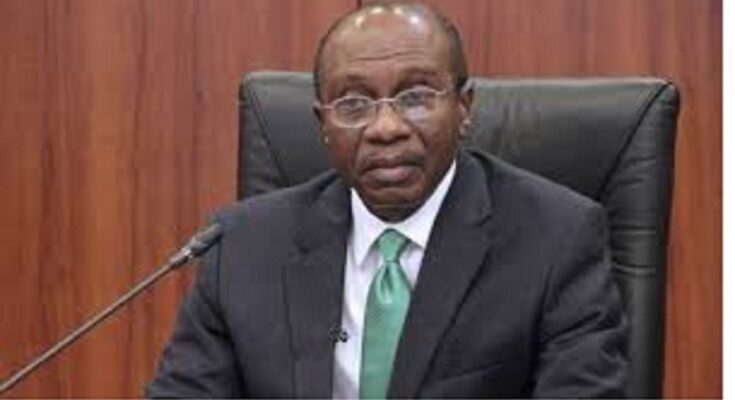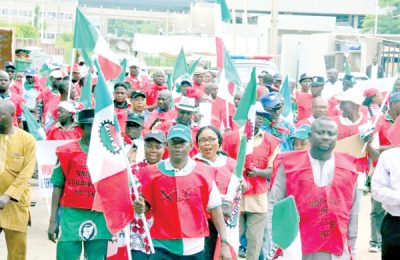

GOVERNOR of the Central Bank of Nigeria (CBN), Godwin Emefiele, on Thursday, shed
more lights on its new pol- icy as rolled out on Decem- ber 5, adding that the policy prouncement is a continua- tion of cashless policy intro- duced 10 years ago.
This was as it disclosed that it had ordered for 500 million pieces of currency for the printing of the redesigned Naira notes.
The CBN boss disclosed this when he appeared before the House of Representatives to brief the lawmakers on the redesign of the Naira as well as the cash withdrawal limit which had generated a lot of heat.
Emefiele, who was repre- sented by the Deputy Gov- ernor, Financial Systems Sta- bility, Mrs Aisha Ahmad, said the new notes were ordered from the Nigerian Security Printing and Minting Com- pany Limited.
Addressing the issue of fake currency, he said, “We are doing a lot of sensitisation be- cause we believe it can’t just be the newspapers, the television and radio. We need to go into the rural areas, the markets and use people in the commu- nities to actually drive home the message. It takes time but, over time, it improves.”
He also said the cashless policy is not based on any political consideration as the CBN is an independent insti- tution whose decisions are based on research, data and efforts of many teams work- ing together across its differ- ent directorates.
Shedding more lights on the policy, the CBN said elec- tronic transfers in the country as of October 2022 stood at N300 trillion from N3 trillion in 2012 when the policy was introduced.
He said this represents a 7,000 percent increase, adding that in 2012, the country had N48 billion in POS transactions, but today it has N6 trillion.
He said the policy pro- nouncement on December 5 is a continuation of the cash- less policy started 10 years ago and in recognition of the positive changes recorded in the financial and payment system since it first launched.
According to him, “today, we have a very robust pay- ment system that includes bank branches, branches of micro-finance banks, POS machines, ATM machines, agent banking, E-Naira and many other options.
“To be specific, between the bank and the micro-finance banks, we have 6,500 loca- tions, 900,000 POS terminals, 14,000 ATMs across the coun- try and 1.4 million agents na- tionwide and every single lo- cal government in Nigeria has agent represented.
“We also have a prolifer- ation of electronic transac- tions. Just by way of quick ex- ample, in 2012, we had N48 billion in POS transactions. Today, we have N6 trillion in POS transactions.
“On electronic transfers, we had N3 trillion in 2012. Today, we have N300 trillion as of October, 2022. That’s a 7,000 percent increase. We have also seen an improvement in financial inclusion to 54.1 percent and lastly, perhaps, more importantly, we have seen the evolution of the Ni- gerian payment system on the global stage.
“Nigeria is judged sixth in the world for instant real payment and we are only behind coun- tries like India, China, Thailand, Brazil and South Korea. We are the only African country in the top 10 and this has been as a result of some of the initiatives that have gone on.
“Also, electronic payment and real time data payments have been estimated to con- tribute about 0.67 percent to our GDP.
“Going to the cash with- drawal limit that was issued in response to the feedback from Nigerians in response to the comments made by this revered chamber, we took those feedback on board.
“CBN mentioned that we will be flexible in the imple- mentation of this policy in response to the stakeholders’ sentiments. We have since reviewed the limit signifi- cantly from N100,000 that we had per week to N500,000 per week for individuals; from N500,000 per week for corporate to N5 million per week. We have also amended the processing from five and 10 percent downward to three and five percent.
“We have clarified the stra- tegic importance of agents as important participants in the financial system because they play a key role in certain underserved segments in the rural areas and in certain markets areas and they as well would be covered by this new revised rule.
“Finally, I thought it was im- portant Mr Speaker, to give some justifications as to why these limits are required now andwhyitistimeforusto get cashless nationwide. The data available to us shows that 94 percent of all cash transactions falls below the N500,000 limit and this in- cludes in areas in the country that are not part of the cash- less policy. 82 percent of cor- porate transactions also are below this limit.
“What does this mean? It means that 94 percent of all individual transactions will not be affected by this fees that we have talked about.
“I have seen some miscon- ceptions about the fees that we are charging. It is not the fees on the entire amount that wants to be withdrawn. No. The fees are to be charged on any withdrawal above the limit. For exam- ple, if you are withdrawing N550,000, the fee will be on the N50,000. We also looked at transactions for agents. So, transactions by Nigerians that go to the agent’s location and transactions by the agent’s themselves, the average cash transactions of agents is N2,184,000 which is clearly within the current limit. The average transaction per in- dividual that walks up to an agent is about N18,000.
“What the policy is trying to do is to encourage more peo- ple to come into the formal payment system because of the numerous benefits that accrue. It means opening up our rural areas, the under- served areas to economic op- portunity, to payment oppor- tunity and connecting them into the formal system.
“During the COVID-19 pe- riod, we saw the negative impact of physical cash. No one could go anywhere. We couldn’t go to the banks. People couldn’t leave their homes. It was the electronic banking system that pro- tected and served those be- low the poverty lines that had their livelihood at risk.
“To clarify some miscon- ceptions, I think it is also im- portant to mention from the data that we have, we have seen the denominations that are not going to be rede- signed, the N100, N50, N10 and N5 are predominantly used in the hinterlands and in the rural areas and those are not going to be affected by the policy. Also, you have ac- cess to your money. So, there is prohibition in terms of what you want to collect. It is for certain large amount, you need to provide additional in- formation.
He said the cash withdrawal limit will help tackle kidnap- ping and reduce cost of mint- ing new notes.
“We just want to reiterate the overall benefits of the cashless policy. It is to reduce cash processing cost, minting cost, the cost of destroying old notes and cost of moving the physical cash from place to place. All these costs are passed on typically to the banking public. Getting rid of these costs means that charges will be less on that respect. Also this is an oppor- tunity to promote Nigeria’s positive image from money laundering perspective.
“Even the recently passed anti-money laundering law has limits for cash for a reason because cash is usually the medium by which some of these nefarious activities are done. Suffice it to say that the advantages around protecting people from armed robbery, kidnapping, terrorism financ- ing goes without gainsaying.
“We will continue to be open, engage, listen as we implement this policy in re- sponse to the sentiments of Nigerians. It is not intended to disenfranchise anyone, particularly those in vulnera- ble situations, in the rural ar- eas and markets, it is meant to bring everyone into the significant economic oppor- tunity that comes when you are fully included,” he said.
Ahmad said the CBN had ordered for 500 million cur- rency printed for circulation.
She said that the policy was expected to create new jobs in the ICT sector, contrary to insinuations that it would lead to job lost.
Speaker, Honourable Femi Gbajabiamila, said although naira redesign may be a good intention, it is necessary for the apex bank to carry the lawmakers along.
Gbajabiamila queried the CBN rationale for three months’ notice, when other apex banks usually gave more than a year notice for such policies.
“How come can we rationa- lise three months’ notice in a cash-full society compare to England where a year notice was given?” he asked.









